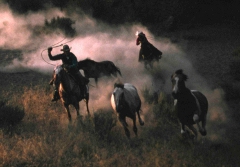 Ramona, written by Helen Hunt Jackson in 1884, is the story of a part-Scottish and part-Native American orphan girl growing up under the influence of the Spanish-Mexican missionaries but suffering later from the rapacity, brutality, rapine and murder of the Yankee Americans as they sought to win the West by force and oppression.
Ramona, written by Helen Hunt Jackson in 1884, is the story of a part-Scottish and part-Native American orphan girl growing up under the influence of the Spanish-Mexican missionaries but suffering later from the rapacity, brutality, rapine and murder of the Yankee Americans as they sought to win the West by force and oppression.Helen Hunt Jackson was the daughter of a Minister and Professor of Classics at Amherst College in Massachusetts. She married an Army Captain who later died at war and she later married a wealthy banker.
The novel was hugely popular, despite its portrayal of the evils of Yankee exploitation. The novel’s impact was great and, once the railroads came, many tourists came looking to see the evidences of the old Mexican ranchero life that still remained from the days of the Spanish Empire.
The story takes place after the American war of annexation of theft in Mexico and is set in Southern California.
Jackson's novel is set in Southern California, shortly after the Mexican-American War. It is about a part-Scottish and part-Indian orphan girl, Ramona is an orphan raised by the sister of his deceased foster mother, Señora Gonzaga Moreno. Señora Moreno detests the rapacious and uncouth Americans whom she is now bound to recognize as her new rulers who have seized most of her lands. But she prefers her own child to Ramona.
Ramona falls in love with a young Indian shepherd, Alessandro, who is also the son of the Chief of the tribe, Pablo Assis but Señora Moreno will not hear of it so Ramona and Alessandra elope. They live lives of hardship and are, with the new daughter, run off their lands several times by rapacious, greedy, brutal Yankee American freebooters.
Alessandro is driven out of his wits by the unpunished lawlessness of the brutal Yankees and after they are forced into the San Bernadino mountains, Alessandro goes into town and rides off on the horse of one of the Yankee exploiters. The Yankee follows him and shoots him out of hand, knowing that he will not be punished by his fellow Yankees.
This was a fine example of how the West was made “wild” not by the Indians or the Spanish but by the damnable greed and licentiousness of the Yankee land-grabbers.
Fortunately for Ramona, the son of Señora Moreno, Felipe, who long ago fell in love with Ramona, finds her and they are married and go to settle in Mexico.
The novel was written after the appearance of a report, A Century of Dishonor, on the exploitation of American Indians.
Some critics have suggested that the novel romanticized the life round the Spanish missions of the Franciscans, the freedom enjoyed by the native Indians, the dignity of the Spanish señoritas and caballeros, ladies and knights, and of the peons or peasants.
However, her account was true. The Franciscans maintained a regime of liberty, peace and religion amongst the Indians with only a handful of Mexican soldiers and there were always many more mission stations than presidios or forts.

Subsequent Yankees have – with low cunning and foul, detestable hypocrisy – sought to pretend that they were bringing civilization to the Indians and were sweeping away the darkness of Romish superstition by defeating the Spanish. They even pretended that they were bringing the Yankee work ethic of “self reliance”.
 Yankee cattle-thieves doing their dirty work which they called "rustling" - they had no time for the Christian nobility of the Mexican missionaries and people
Yankee cattle-thieves doing their dirty work which they called "rustling" - they had no time for the Christian nobility of the Mexican missionaries and peopleThis was a convenient lie designed to do no more than cloak the naked greed of the Yankee exploiters. The missionaries treated the native Indians as men like themselves and with dignity. The Yankee exploiters did the opposite.
In fact, the story of the Spanish missions in California is even more romantic, beautiful and holy than the novel itself tells.

It speaks volumes that black-hearted, bigoted and narrow-minded men of low morals and lower culture should seek to pour scorn and lies upon a story of great courage and beauty, whether it be the fiction of Ramona or the beautifully noble reality of the Hispanic missions in California.
But, then, the Devil is always eager to vilify the beautiful things of God.

Our Lady of California, pray for us!
...
















.jpg)


























_-002.jpg/220px-Circle_of_Anton_Raphael_Mengs,_Henry_Benedict_Maria_Clement_Stuart,_Cardinal_York_(ca_1750)_-002.jpg)



2 comments:
Is history repeating itself now with Mexicans migrating and reclaiming their lands? And are not more Catholics in the US a good thing?
Certainly!
IF they ARE Catholic.
Are they?
Tribunus
Post a Comment